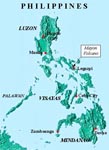Deadly stalemate in Philippine peace talks
 Manila - At the opening of Congress just over a month ago, a beaming President Gloria Macapagal Arroyo declared a breakthrough in peace talks with Muslim separatist rebels aimed at ending decades of strife and violence in the southern Philippines.
Manila - At the opening of Congress just over a month ago, a beaming President Gloria Macapagal Arroyo declared a breakthrough in peace talks with Muslim separatist rebels aimed at ending decades of strife and violence in the southern Philippines.
Arroyo told legislators that peace panels made up of the government and Moro Islamic Liberation Front (MILF) have finally resolved the thorny issue of ancestral domain, which would define a Muslim homeland on the southern island of Mindanao.
But Arroyo's dream of peace quickly turned into a deadly nightmare that led her to dissolve the government peace panel on Wednesday after weeks of intense fighting between soldiers and MILF rebels that left nearly 200 people dead and displaced more than 500,000.
The fighting was triggered by MILF attacks on a number of provinces in Mindanao after the Supreme Court in early August stopped the signing of the ancestral domain agreement due to questions over the deal's constitutionality.
Presidential Executive Secretary Eduardo Ermita said the abolition of the peace panel would give the government a "fresh start" in a new paradigm to achieve peace in Mindanao.
Ermita added that the new negotiations will be conducted "in accordance with the mandates of the Philippine constitution, the rule of law and the principles of sovereignty, territorial integrity and national unity."
But North Cotabato Vice Governor Manuel Pinol, who led opposition against signing the ancestral domain agreement, said the dissolution of the government negotiating panel was a tacit admission that something was wrong with the deal.
Under the failed deal, some 735 villages were to be included in the existing six-province Autonomous Region for Muslim Mindanao and its regional government would be given wider powers.
"It's an admission after all that they erred all along and the process was wrong from the very start," Pinol said. "The government has realized its mistake."
Pinol was among those who filed a petition before the Supreme Court, asking the tribunal to declare the agreement unconstitutional. He warned the deal could lead to the Balkanization of the Philippines.
During a hearing last week, state lawyers asked the Supreme Court to stop the procedures and not rule on the merits of the petition since the government was already scrapping the agreement.
Government lawyers also tried to dissociate Arroyo from the issue by claiming that the president did not read the agreement and did not approve the signing of the deal, which one judge described as "a dangerous agreement."
But Pinol and the other petitioners want the court to rule on the case and set guidelines on how far the government can go in its peace negotiations with the MILF.
"More than just composing a new panel, what the government should do right now would be to look into the parameters of the next negotiations," he said. "Unless the ground rules are set there is no point in naming or identifying the new members of the panel."
Senate Majority Floor Leader Francis Pangilinan said disbanding the government peace panel was an effort by the Arroyo administration to contain the controversy over the deal.
"This is simply damage control," he said. "Government incompetence killed the peace negotiations and so these people have to go and go quickly."
Opposition Senator Francis Escudero agreed with Pangilinan's assessment, noting that the dissolution of the peace panel was an admission that the government botched the peace talks.
"It is good to see that the administration is trying to rectify its mistake by dissolving the peace panel," he said. "This is an opportune time for them to try a new road map concerning the problem in Mindanao."
While some fear that disbanding the panel could led to more clashes between government troops and rebels, the head of the MILF peace panel said that the guerrillas will not launch more attacks unless provoked.
Mohagher Iqbal, the MILF's chief negotiator, said it is very unlikely that a peace agreement between his group and the government could still be reached before Arroyo's term ends in 2010.
"It is obvious that there will be no signing of a peace accord under the Arroyo government," he said. "It has changed its direction in the peace process from problem solving to a counter-insurgency and military solution."
Iqbal expressed concern the government is preparing an all-out offensive against the MILF similar to the military operation ordered by former president Joseph Estrada in 2000, which led to the fall of the rebel group's main camp in Mindanao. (dpa)